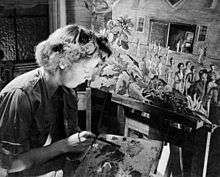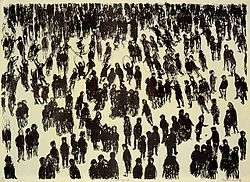Molly Bobak
| Molly Bobak | |
|---|---|
 Molly Bobak painting on canvas, undated. | |
| Born |
February 25, 1922 Vancouver, British Columbia |
| Died |
March 2, 2014 Fredericton, New Brunswick |
| Nationality | Canadian |
| Education | Jack Shadbolt, Vancouver School of Art |
| Known for | Painting, printmaking |
Molly Bobak CM ONB (née Lamb; February 25, 1922 – March 2, 2014) was a Canadian teacher, writer, printmaker and painter working in oils and watercolours. During World War II, she was the first Canadian woman artist to be sent overseas to document Canada's war effort, and in particular, the work of the Canadian Women's Army Corps (C.W.A.C).
Life and career
Early life
Born Molly Lamb on February 25, 1922,[1] Bobak grew up in Vancouver, British Columbia. Bobak's mother, Mary Williams, initially worked as a housekeeper for Bobak's father, Harold Mortimer-Lamb, when his wife became ill. At some point, her parents decided to move in together along with Mortimer-Lamb's wife and their children. Bobak and her extended family seemed to live happily in this unconventional household.[2]
Mortimer-Lamb was an art critic and collector who befriended the artists of the Group of Seven, who would visit the family on occasion.[3]
Bobak's reputed poor eyesight and dislike for her teachers left her with poor school marks. Recognizing this, Bobak's mother encouraged her daughter to enroll at the Vancouver School of Art studying with artist Jack Shadbolt, whom she would remain close friends with all her life. Shadbolt enthusiastically encouraged her, and led her to discover European artists such as Cézanne and Matisse.[4]
World War II
Bobak enlisted in the Canadian Women's Army Corps (C.W.A.C) in 1942 and stayed for four years. This was a vast opportunity as it allowed her to travel and gain new skills. She traveled across Canada and after Victory in Europe Day she went to London, England where she met her future husband, artist Bruno Bobak. As part of the C.W.A.C., she was appointed to document training, marching, working and any other contributions to the war.[5]
Post-War
After the end of the war, the Bobaks had a son, Alex, and tried to make a living on the West Coast by painting, teaching, and other various jobs. She painted little during these years, as she was busy looking after her children and teaching painting at night school. However, she met Jacques Maritain, a French Thomist philosopher and Vatican ambassador to the United States. He was impressed with her work, and arranged for a visit to France on a French Government Scholarship.[6]
Alan Jarvis, Director of the National Gallery of Canada was also impressed by her work, and invited her to participate in exhibitions such as the Sao Paulo Biennial and the Vancouver Art Gallery's Third Canadian Biennial in 1960. Through these exhibitions, she was able to enjoy increasing financial success and popularity.[7]
She was among the first generation of Canadian women artists to work professionally and earn a living from their art. She was one of the fortunate women of the time, as her husband fully supported her art.[8]
Life in Fredericton

After spending four years in Europe with money from a grant by the Canada Council, Bruno was offered a position teaching at the University of New Brunswick in Fredericton, New Brunswick. Bruno and Molly settled in Fredericton, where she continued to live.[9]
In 1973, she was elected to the Royal Canadian Academy of Arts[10] and in 1993, the MacKenzie Art Gallery in Regina, Saskatchewan organized a major touring retrospective of her work.[11]
Bobak is now most widely recognized for her depictions of crowds of people and her work from WWII. Her paintings of crowded scenes serve to record public events and visual experiences of large numbers of people sharing the same space, time and celebration. However, she denies that they are purely records or memorials of events and not social and psychological investigations. They remain for Bobak, an aesthetic challenge because of their dynamic constantly changing rhythm.[12]
Death
Bobak died March 2, 2014.[13] There were 32 official war artists in World War II and she was the last surviving member.
Awards and honours
- Canadian Army Art Competition, 1944.
- First prize, Graphic Art Society, 1966.
- French Government scholarship for study in France, 1950–51.
- Canada Council fellowship for study in Europe, 1960–61.
- Order of Canada, 1995.[14]
- Order of New Brunswick, 2002.[14]
See also
Notes
- ↑ Creative Canada: A Biographical Dictionary of Twentieth-century Creative and Performing Artists. Published. 1972. ISBN 978-0-8020-0196-2. Retrieved 2014-03-03.
- ↑ Richmond, 28.
- ↑ Richmond, 29.
- ↑ Richmond, 30–32.
- ↑ Richmond, 32–35.
- ↑ Richmond, 37–39.
- ↑ Richmond, 43.
- ↑ Richmond, 26.
- ↑ Richmond, 48.
- ↑ "Members since 1880". Royal Canadian Academy of Arts. Retrieved September 11, 2013.
- ↑ National Gallery of Canada, http://cybermuse.gallery.ca/cybermuse/docs/bio_artistid551_e.jsp, accessed May 23, 2008.
- ↑ Richmond, 48–49.
- ↑ Qmi Agency (March 2, 2014). "Canada's first female war artist dies at age 95". Sun News. Retrieved 2014-03-03.
- 1 2 "Molly Lamb Bobak, Canada's first female overseas war artist, dead at 95", CBC News"
References
- Carolyn Gossage co-author *Bobak, Molly Lamb. Double duty: sketches and diaries of Molly Bobak, Canadian war artist. Toronto: Dundurn Press, 1992. ISBN 1-55002-166-4
- Richmond, Cindy and Brian Foss. Molly Bobak: a retrospective. Regina, Sask.: MacKenzie Art Gallery, 1993. ISBN 0-920922-88-0
- Tippett, Maria. By A Lady. Toronto: Viking Canada, 1992. ISBN 0-670-84458-6
- Robb, Peter. Molly Lamb Bobak 1920-2014. Ottawa Citizen, Ottawa, ON. 03.02.2014
- Lawlor, Allison. Molly Lamb Bobak was first Canadian woman sent overseas as war artist.The Globe and Mail, Toronto, ON, March 14, 2014
External links
- Brief biography and select images from the National Gallery of Canada.
- Selection of Bobak’s works at the Gallerie Walter Klinkhoff.